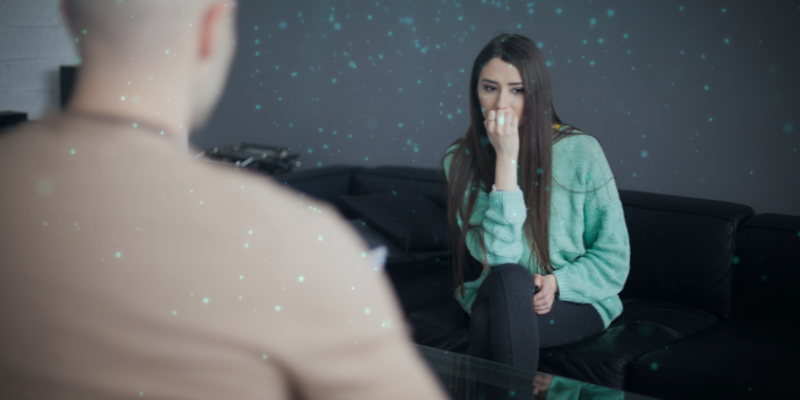
At face value, Nikki Leigh appears to have it all. A bright and attractive actress, model, and host of the Positivity Time podcast, Leigh boasts nearly 5 million followers on Facebook. But she wasn’t always so popular. In fact, in a revealing episode of Scan My Brain, Leigh admits that when she was in junior high, she was bullied. “I had no friends and felt super alone,” she tells Dr. Daniel Amen, founder of Amen Clinics, in the video. “I had people beat me up.”
She tried desperately to get the people who didn’t like her to change their opinion of her and become friends, but it didn’t work. The bullying eventually got so intense that Leigh fell into depression. “I told my mom one day that I just didn’t want to live anymore, and she broke. I didn’t realize why, but I learned later on that her dad committed suicide,” she says.
Leigh’s brain SPECT scan showed overactivity in the emotional centers of the brain. Based on the Amen Clinics database of over 170,000 brain scans, the diamond-shaped pattern seen on Leigh’s scan is common in people with mood issues, anxiety, and worry.
Based on the Amen Clinics database of over 170,000 brain scans, overactivity in a diamond-shaped pattern in the emotional centers of the brain is common in people with mood issues, anxiety, and worry. Click To TweetCan being unpopular in school lead to mental health problems later in life? The research is heartbreaking.
THE MENTAL AND PHYSICAL COSTS OF UNPOPULARITY
Being unpopular can have devastating impacts on mental wellness, according to a decades-long study appearing in the Journal of Epidemiology and Community Health. At the outset of this study in 1966, Swedish researchers asked 12,500 6th graders to choose the 3 classmates they liked working with best. The kids who were named by 7 or more of their classmates were deemed “favorites.” On the other end of the spectrum, students who were named by only one of their peers were considered “peripheral” and those who weren’t chosen by any of their schoolmates were categorized as “marginalized.”
When the children turned 50 years old several decades later, the researchers analyzed hospitalizations based on their peer status categories. The children considered peripheral or marginalized were more likely to have been hospitalized for physical or mental health issues. For example, men and women who had been in the marginalized group were approximately twice as likely as those in the favorites groups to have received inpatient care for mental health and behavioral disorders, including alcohol or drug abuse. Adults who were marginalized as children were also more likely to have died by suicide and to have a range of lifestyle-related diseases, such as heart disease or diabetes.
Another study out of Sweden in 2012 re-confirmed that being unpopular in school can make you unhappier and unhealthier later in life. In this research published in Plos One, middle-aged adults who had been unpopular in high school were more likely to have medical problems, including obesity, diabetes, high blood pressure, and poor cholesterol ratios. By age 43, those who had been ostracized as teens had a higher risk of having metabolic syndrome, which is a combination of all of these conditions.
Although this study only looked at physical health consequences, it’s important to note that these medical issues also increase the risk of psychiatric issues. For example, being obese carries a greater risk of depression, bipolar disorder, panic disorder, agoraphobia (fear of going out), and addictions. Being overweight is also associated with untreated ADD/ADHD and lower self-esteem. Research in the American Journal of Public Health also shows that among women, increased body mass index (BMI) is linked to a rise in suicidal thoughts.
Similarly, diabetes can take a devastating toll on mental well-being. Anxiety and depression are 2-3 times higher in patients with diabetes than in the general population, according to a 2016 study and a 2018 study. Findings from a 2015 study show that people with diabetes are also at greater risk for eating disorders, such as binge eating.
Feeling stressed from these findings? Take heart that even if you weren’t part of the popular crowd at school, you can overcome the health and psychological problems associated with being socially isolated. It starts with your mindset.
ADOPTING A MORE POSITIVE MINDSET
For Nikki Leigh, opening up about her difficult school days and starting a podcast called “Positivity Time” has helped her deal with the depression and suicidal thoughts she used to feel. On the podcast, she routinely expresses gratitude and shares random acts of kindness with her listeners. Leigh naturally gravitated to focusing her energies on being more upbeat, but there is science to explain why her strategy can be so helpful.
Positivity bias training is a proven practice that can help you overcome negativity, low self-esteem, and other issues, even if they were embedded in your psyche during your formative years at school. Positivity bias training basically means actively seeking out the positive in life—noticing what you like more than what you don’t like, showing gratitude, and changing the way you think.
With these techniques, you have the potential to emerge from decades of feeling bad about yourself due to your school experience. And when you feel happier and more self-confident, you are also more likely to adopt healthy habits that will further enhance your body and brain. It’s a win-win situation.
Depression, anxiety, suicidal thoughts, and other mental health issues can’t wait. At Amen Clinics, we’re here for you. We offer in-clinic brain scanning and appointments, as well as mental telehealth, clinical evaluations, and therapy for adults, teens, children, and couples. Find out more by speaking to a specialist today at 888-288-9834 or visit our contact page here.





Ꮃow! At last I got a blog from where I be capable of in fact get valuable information concerning my
study and knowledge.
Comment by bats — November 16, 2023 @ 10:27 AM
Нello, this weekend is pleasant for me, as this moment i am reading this fantastic
informative piece of writing here at my һome.
Comment by repealing — November 29, 2023 @ 2:58 PM